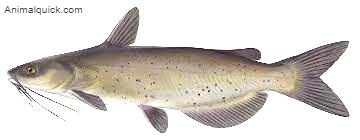Catfish is a very popular species worldwide.
Let’s find out if Catfish Can Live With Goldfish!
Can Catfish Live With Goldfish? It’s not a good idea to put catfish with goldfish.
Catfish can get bigger and bully the goldfish. Also, they like different living conditions, so it’s better to keep them apart.
Can Catfish Live With Goldfish?
It is not a good idea to keep catfish and goldfish together in the same aquarium.
They have different preferences for water conditions, how they behave, what they eat, and even the size of the tank they need.
- Water Temperature: Goldfish like cooler water, while many catfish like it warmer. It’s hard to make both happy.
- Behavior: Goldfish are slower, and catfish can be more active and aggressive. The catfish might nip at the goldfish’s fins, causing issues.
- Diet: Goldfish eat plants, while catfish eat a mix of things. Feeding them both the right way can be tricky.
- Tank Size: Both can grow big, and they need a lot of space. Crowded tanks stress them out and can make them sick.
What Catfish Can I Put With My Goldfish?
You can put different catfish species with your goldfish like Corydoras Catfish, Bristlenose Plecos, and Dojo Loach.
- Corydoras Catfish: These are small, friendly catfish that hang out at the bottom of the tank. There are different kinds, like Corydoras paleatus and Corydoras aeneus, but make sure they like the same water temperature.
- Bristlenose Plecos: These catfish are good at eating algae and are usually calm. Check if their temperature needs to match your goldfish.
- Dojo Loach: Also known as weather loaches, these guys are interesting and usually peaceful. They like cooler water, so check if that works for your goldfish.
Can Goldfish Live in Pond With Catfish?
Yes, goldfish can live with catfish in a pond.
- Pond Size: Make sure your pond is big enough for both types of fish. A larger pond gives them more room to swim and avoids overcrowding.
- Water Conditions: Check that the water is good for both goldfish and catfish. Keep an eye on temperature, pH, ammonia, and nitrite levels.
- Temperature: Goldfish like cooler water, while catfish like it a bit warmer. Choose catfish that are okay with the temperature goldfish like, or the other way around.
- Feeding: Goldfish eat plants and small creatures, while catfish eat a mix of things. Feed them the right food, but not too much to keep the water clean.
- Hiding Spots: Add places for catfish to hide, especially during the day. They may be more active at night.
- Species Compatibility: Some catfish types can be bossy. Research the kind of catfish you want and see if they get along with goldfish.
- Watch Behavior: Keep an eye on how they act. If they seem stressed or fight, make changes like adding more hiding spots or separating them.
Why is My Catfish Attacking My Other Fish?
Your catfish can attack other fishes because of the protecting territory, there are too many fish, or not having enough hiding spots.
- Protecting Territory: Catfish can get territorial, especially during breeding time. If there aren’t enough hiding spots or territories for each fish, your catfish might become bossy to show who’s in charge.
- Too Many Fish: If your aquarium or pond is too crowded, the fish might fight for space and resources. Make sure there’s enough room for each fish, and don’t overload the tank.
- Not Enough Hiding Spots: All fish need places to hide when they feel stressed. If there aren’t enough hiding spots, your catfish might act out to claim its space.
- Wrong Tank Mates: Some fish don’t get along. Check if your catfish is compatible with its tankmates. If not, it could lead to fights.
- Food Competition: Fighting over food is common. Make sure everyone gets enough to eat and try feeding them in different spots to avoid conflicts.
- Health Issues: Sick fish can get aggressive. Monitor their overall health and look for signs of disease or discomfort.
- Breeding Season: During breeding time, catfish can get more aggressive. If there are breeding pairs, they might defend their territory more fiercely.
To solve aggression issues:
- Add More Hiding Spots: Make sure there are plenty of places for all fish to hide and feel safe.
- Check Tank Mates: Make sure your catfish gets along with the other fish. Some catfish might need their own space.
- Bigger Tank: If possible, get a larger tank or pond to reduce fights over space.
- Water Quality Check: Ensure the water is clean and healthy. Bad water conditions can stress fish and make them aggressive.
Also, read:
- Do Catfish Have Teeth?
- What Do Catfish Eat?
- Why Are Blue Catfish a Problem?
- When Blue Catfish Become Blue?
- Can Catfish Live Without an Air Pump?
FAQs
Can Catfish Live With Goldfish in a Tank?
It’s generally not recommended. Catfish may outgrow tanks quickly and have different environmental preferences. Some catfish might also be aggressive, posing a threat to goldfish.
Can Catfish Live With Goldfish in a Pond?
In a large pond, some catfish species may coexist with goldfish. However, consider the specific needs of each species and ensure adequate space and proper pond conditions.
Can Angelfish Live With Goldfish?
It’s not advisable. Angelfish prefer warmer water than goldfish, and their different temperaments and feeding habits could lead to compatibility issues. Keep them in separate tanks.
Can albino cory catfish live with goldfish?
Albino cory catfish may coexist with goldfish, provided the tank is spacious, and well-maintained, and the catfish won’t become aggressive. Monitor their interactions and ensure suitable conditions for both.
Can a pictus catfish live with a goldfish?
Not recommended. Pictus catfish have different temperature requirements and can be more active, potentially stressing goldfish. It’s advisable to keep them in separate tanks with compatible tankmates.
Can small catfish live with goldfish?
It depends on the catfish species. Some smaller catfish may coexist with goldfish in a well-maintained tank, but compatibility varies. Research specific species and monitor their interactions closely.

I love animals & want to know more about different creatures & sharing their stories with everyone. From my childhood, I’ve been exploring forests & watching animals in their homes.
Now, I write about my adventures & all the amazing things I learned. My blogs are easy to understand & make you want to know more about animals. I teach about why animals are important & why we should take care of them.
